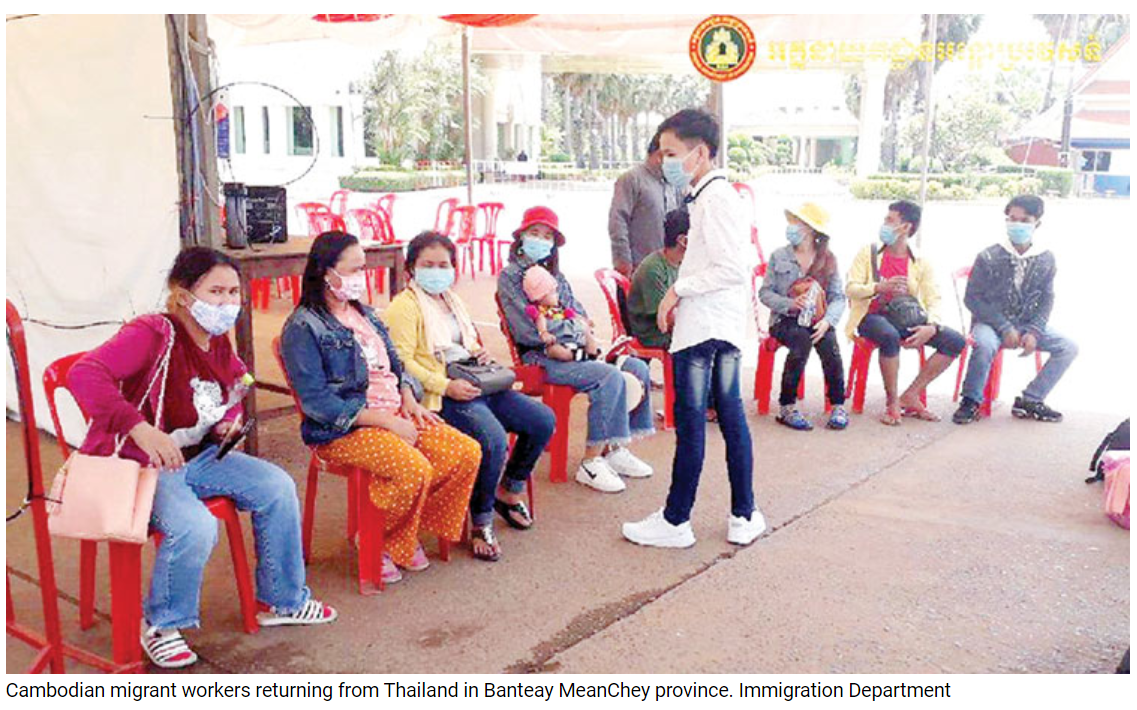Cambodia: Sharp drop in wages sent back to Kingdom
Cambodia is to join the ranks of declining overseas worker remittances this year after the World Bank projected global remittances will decline sharply by about 20 percent in 2020 because of the economic crisis induced by the COVID-19 pandemic and consequent business shutdowns
The projected fall, which would be the sharpest decline in recent history, is largely down to a decline in wages and the employment of migrant workers, who tend to be more vulnerable to loss of employment and compensation during an economic crisis in a host country.
Global remittances to low- and middle-income countries (LMICs) are projected to fall by 19.7 percent to $445 billion, according to the World Bank.
This would reduce Cambodian’s money sent back home by its more than 1.2 million workers in countries such as Thailand, South Korea, Japan, Singapore, Hong Kong, Malaysia and Saudi Arabia substantially from the $2.8 billion remitted last year.
South Korea and Thailand are the largest source of remittances to Cambodia.
According to the World Bank, money transfer costs from Thailand to neighbouring countries in Southeast Asia were among the highest, averaging 12.1 percent in the last quarter of 2019.
The report shows more than 60,000 migrant workers from Myanmar, Cambodia and the Lao People’s Democratic Republic left Thailand, defying requests by officials to remain in the country to help contain the virus and raising fears of cross‐border infections.
Ngeth Chou, a senior consultant for Emerging Markets Consulting, has estimated that Cambodia could lose about $90 million for six months of remittances from Thailand.
“There are 50,000 Cambodian migrant workers who have returned from Thailand because of the Coronavirus pandemic and, on average, they send money back home about $300 a month, so in six months we will lose about $90million,” he said.
According to data from ACLEDA Bank Plc, money sent back home by only Cambodian workers from South Korea during the first quarter 2020 was $3.5 million with 1,373 transactions, a decrease from $6.2 million with 2,270 transaction in the same period last year. However, the data shows that all migrant workers saw their total remittances transferred increase 28.3 percent during the period.
Remittance flows to the East Asia and Pacific region grew by 2.6 percent to $147 billion in 2019, about 4.3 percentage points lower than the growth rate in 2018. In 2020, remittance flows are expected to decline by 13 percent.
Studies show that remittances alleviate poverty in lower- and middle-income countries, improve nutritional outcomes, are associated with higher spending on education and reduce child labour in disadvantaged households.
A fall in remittances affects families’ abilities to spend on these areas because more of their finances will be directed to solve food shortages and immediate livelihoods needs.
World Bank Group President David Malpass said that remittances are a vital source of income for developing countries. The ongoing economic recession caused by COVID-19 is taking a severe toll on the ability to send money home and makes it all the more vital that we shorten the time for advanced economies to recover.
“Remittances help families afford food, healthcare,and basic needs. As the World Bank Group implements fast, broad action to support countries, we are working to keep remittance channels open and safeguard the poorest communities’ access to these most basic needs,” he said.
A report from World Economic Forum (WEF) shows that in 2019 an estimated 200 million people in the global migrant workforce sent home $715 billion. Of this, its estimated $551billion supported up to 800 million households living in low- and middle-income countries.
Source: https://www.khmertimeskh.com/50717705/sharp-drop-in-wages-sent-back-to-kingdom/


 Thailand
Thailand




